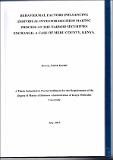Behavioural Factors Influencing Individual Investor Decision-Making Process at the Nairobi Securities Exchange

View/
Date
2015-07Author
Kirera, Fridah Karimi
Type
ThesisLanguage
enMetadata
Show full item recordAbstract
Although finance has been studied for thousands years, behavioral finance which usually considers the human behaviors in finance is quite a new area. Behavioral finance theories, which are based on the psychology, attempt to understand how emotions and cognitive errors influence individual investors' behaviors. The main objective of this study was to explore the behavioral factors influencing individual investors' decisions at the Nairobi Securities Exchange. As there are limited studies about behavioral finance in Kenya, this study is expected to contribute significantly to the development of this field in Kenya. This study begins with the existing theories in behavioral finance namely Efficient Market Hypothesis, Prospect theory, and Heuristic theory, based on which the conceptual framework is derived. A descriptive research design was adopted in conducting this study Hypotheses are derived from the existing theories. These hypotheses were tested using Bartlett's test of Sphercity with an acceptable level of significance associated probability less than 0.05 through the questionnaires distributed to individual investors at the Nairobi Securities Exchange. Primary data was collected using closed - ended questionnaires. Factor analysis was used to analyse data aided by SPSS; to show the relationship between independent variables (herding variables, market variables, prospect variables and heuristic variables) and the dependent variable (individual investor decision- making in the NSE); and to test the hypotheses. The research was analyzed using 95% confidence level to test hypotheses. The results show that there are five behavioral factors affecting the investment decision making process of individual investors at the NSE: Herding, Market, Prospect, Overconfidence and Gamblers fallacy, and Anchoring-availability bias. Most of these factors have moderate impacts while market factors have a high influence. The study failed to reject three null hypotheses stating that there is a significant relationship between the market, prospect and heuristics variables and individual investor's decision making process. The study rejected one null hypothesis concluding that there is no significant relationship between herding variables and individual investor investment decisions.
Publisher
KeMU
Subject
Individual investor decision-making processIndividual investor decision making process at the Nairobi Securities Exchange
Description
HG 4515.15 .K57 2015
